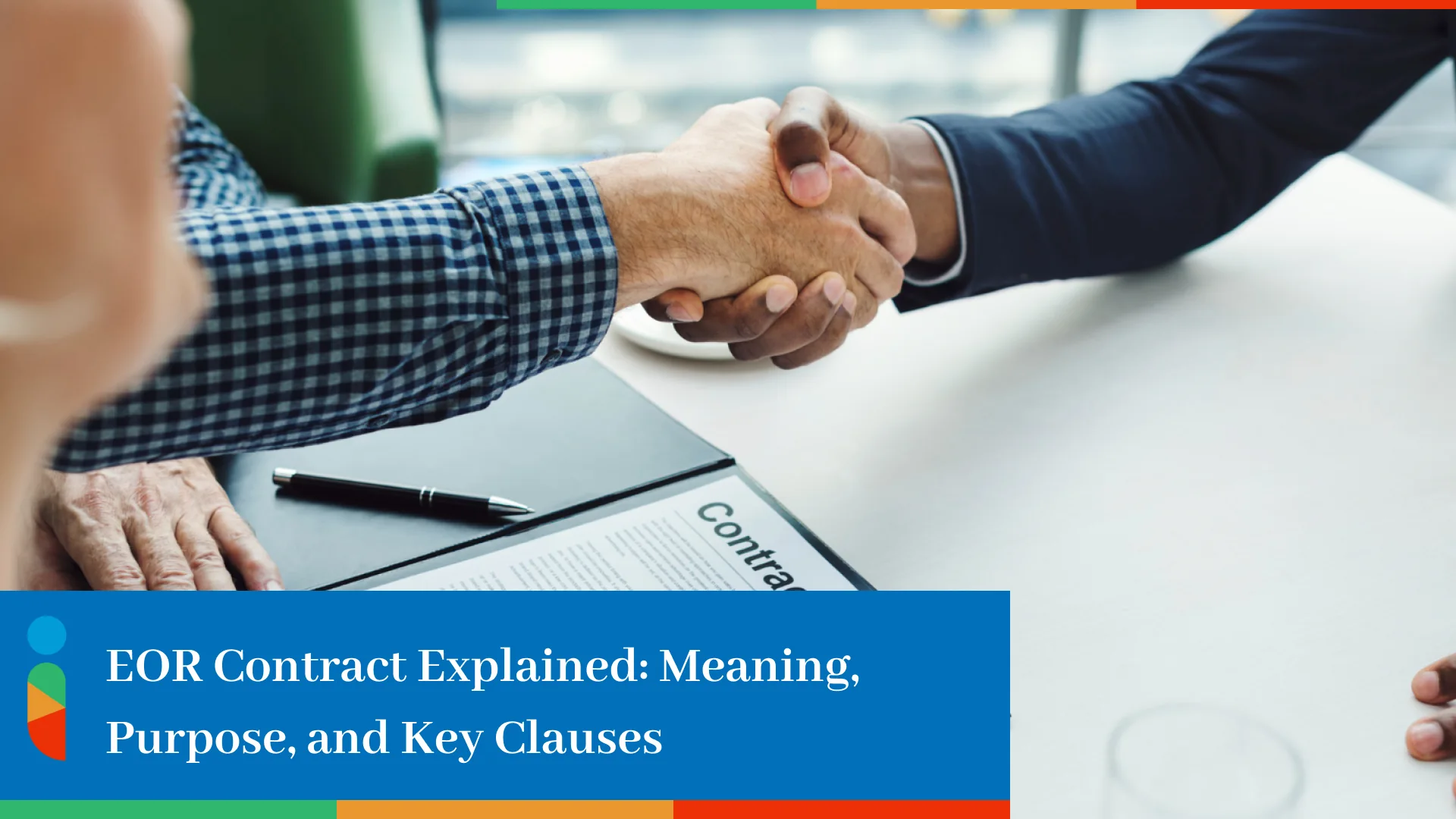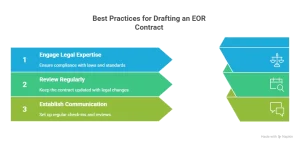If you’re someone who is seeking to hire internationally without the legal headache, an EOR contract can be your secret weapon. A gateway to global employment and guarantees you avoid costly mistakes so that you can scale smoothly.
In this guide, we break down what an EOR contract means. Know its key benefits, challenges, and best practices!
What is an EOR Contract?: EOR Contract Meaning
An EOR contract isn’t a routine agreement. The contract forms the backbone of a compliant Employer of Record model for your business. It helps you minimize legal risk and gives you peace of mind.
Definition and Legal Nature
An EOR contract defines a triangular relationship between your company, the EOR provider, and the employee. It becomes the legal employer on paper, and your company manages the employee’s day-to-day work. The EOR contract shifts employer liability to a legally registered partner in the hiring country. Quite different from a standard employment contract. It’s a smart way to hire without setting up a local entity.
Purpose of an EOR Contract
An EOR contract ensures your hiring follows local laws with payroll regulations, and employment requirements. The contract spells out who does what, like your company handles performance management; the EOR handles taxes, benefits, and onboarding
Plus, an EOR contract protects your business from penalties tied to noncompliance or misclassification. This may happen by passing employment risks onto the EOR.
Looking for A Seamless Way to Onboard Employees Abroad? Let’s Make It Simple with EOR
EOR Contract Structures
EOR contracts come in several formats. These are tailored to regional norms and business needs.
Tripartite Agreements
These contracts are signed by the company, EOR, and employee. This agreement is common in jurisdictions with complex legal rules and gives clarity and transparency for all parties. But it is harder to negotiate and bulkier to execute.
Bipartite + Separate Employment Contracts
This contract type is the most widely used structure. Your company signs a service agreement with the EOR, and the EOR signs a separate employment contract with the employee. This contract offers greater flexibility and easier renegotiation.
Hybrid or Custom Structures
Some jurisdictions require blended approaches. They add arbitration frameworks or tailored clauses for specific roles. These fit roles with regulatory or operational complexity. The approach reflects a nuanced EOR model. Specifically crafted to your business needs.
You May Also Like: Employer of Record vs Agent of Record
Key Clauses of EOR Contract
EOR contract’s power lies in its clarity. Each clause protects your business and assures smooth operations.
Scope of Services
An agreement outlines what the EOR does and what your business handles. Set clear boundaries to prevent confusion. It is wise to partner with quality HR solutions to streamline these scopes effectively.
Roles and Responsibilities
Define EOR’s obligations, like payroll, compliance, etc. Specify your obligations, including assigning work, managing performance, and others. This also involves terms around work hours that guarantee time-tracking and compliance.
Pricing and Fees
Must specify your cost structure and avoid surprises by listing one-time charges on onboarding or termination. Use real average salary benchmarks, as it will build transparent models with the EOR.
Confidentiality and Data Protection
EORs handle personal and company data. Therefore, contracts must include strong confidentiality provisions and compliance with GDPR. Guaranteeing a secure partnership with your EOR service provider.
Dispute Resolution & Governing Law
State which jurisdiction’s laws apply and how disputes get resolved. There are three methods to resolve it through mediation, arbitration, or court. This setup helps you avoid costly legal surprises.
Termination Clauses
Define termination triggers, including non-compliance, redundancy, relocation, outlines for severance or notice, and protect both parties. You may include a defined notice period that assures legal compliance and smoother transitions.
Top Advantages of EOR Contract
Without a doubt, an EOR contract does more than check legal boxes. This accelerates growth and shields your business.
Legal Protection
Minimize compliance risks when entering new markets where employment rules vary widely. A solid contract assures the EOR meets all local requirements.
Operational Efficiency
Your team saves time with admin handled by the EOR. Thus, you have plenty of time to focus on, prioritize growth and talent management.
Cost Control
Fair and transparent fee structures with fair terms help avoid hidden charges. It eventually stabilizes your global hiring budget.
Ready to Expand Your Workforce in Spain without The Hassle?
Common Challenges in Drafting EOR Contracts
EOR contracts are powerful. Still, these contracts can be tricky. Understanding the pitfalls helps you prevent the challenges and issues that arise in drafting EOR contracts.
Aligning Expectations
Clients sometimes struggle over who controls HR decisions or performance output. Clarifying the main functions of HR within the contract is important. It ensures responsibilities align with reality.
Managing Costs Transparently
Word-of-mouth shows companies can be blindsided by unexpected fees. Make sure your contract spells out all potential charges upfront.
Maintaining Flexibility
The contract must allow easy scaling or adjustment as your needs evolve. This is without requiring full renegotiation.
You May Also Like: HR Mistakes to Avoid
Best Practices for Drafting an EOR Contract
Smart companies treat their contract like living document. We’ve crafted a list for you to better draft and manage your EOR contract.
Engage Legal Expertise Early
You can utilize experienced international employment lawyers. This ensures your contract aligns with local legislation and global standards.
Review and Update Regularly
You should stay proactive as local laws change fast. Regular reviews keep your agreement current and avoid future risks.
Establish Clear Communication Channels
You may set regular check-ins and performance reviews. To streamline working together, include an employee documents checklist.
Alternatives to EOR Contracts
Thinking about the alternatives to EOR contracts? Know that EOR contracts are powerful, but they’re not the only route to hire globally.
Hiring Freelancers or Contractors
Outsourcing work to freelancers or contractors is easy and flexible. Misclassification risks can make this costly if authorities view them as de facto employees.
Setting Up a Local Entity
Setting up a local entity gives full control. But involves huge cost, setup time, and administrative burden. This may make sense for long-term presence. It’s high time for you to start a company.
Local Employer Registration
You can register a local employer branch in some countries. This gives more control than an EOR. However, it requires a partial compliance setup with local administration.
Conclusion
In conclusion, an EOR contract isn’t just legal paperwork. But it’s your passport to efficient global expansion. The contract defines responsibilities. It protects against local risk and unlocks fast onboarding of talent worldwide. The right contract empowers growth if well-drafted and actively managed
Are you thinking of going global? Iberia EOR brings deep regional expertise. Specifically offered for businesses looking at EOR services in Spain. This will make expansion smoother and fully compliant.
Every Expansion Is Unique – Our EOR Solutions Are Tailored to Your Business Needs
FAQs
What Is an EOR Contract in Simple Terms?
An EOR contract is a legal agreement where an EOR becomes the official employer on behalf of your company while you manage the work.
How is an EOR Contract Different From a Regular Employment Contract?
A regular contract binds your company to legal obligations. However, an EOR contract shifts those obligations to the EOR in the worker’s jurisdiction.
Who Should Sign The EOR Contract, The Employer or The Employee?
The EOR contract involves your company and the EOR. The employee signs a separate local employment agreement with the EOR.
What Happens If There’s a Dispute Under an EOR Contract?
The contract’s dispute-resolution clause dictates the process. This often starts with mediation. Followed by arbitration or court in the specified jurisdiction.
Can an EOR Contract be Customized For Specific Business Needs?
Many EOR arrangements use hybrid or bespoke models. These are used to match complex hiring or regulatory environments.








